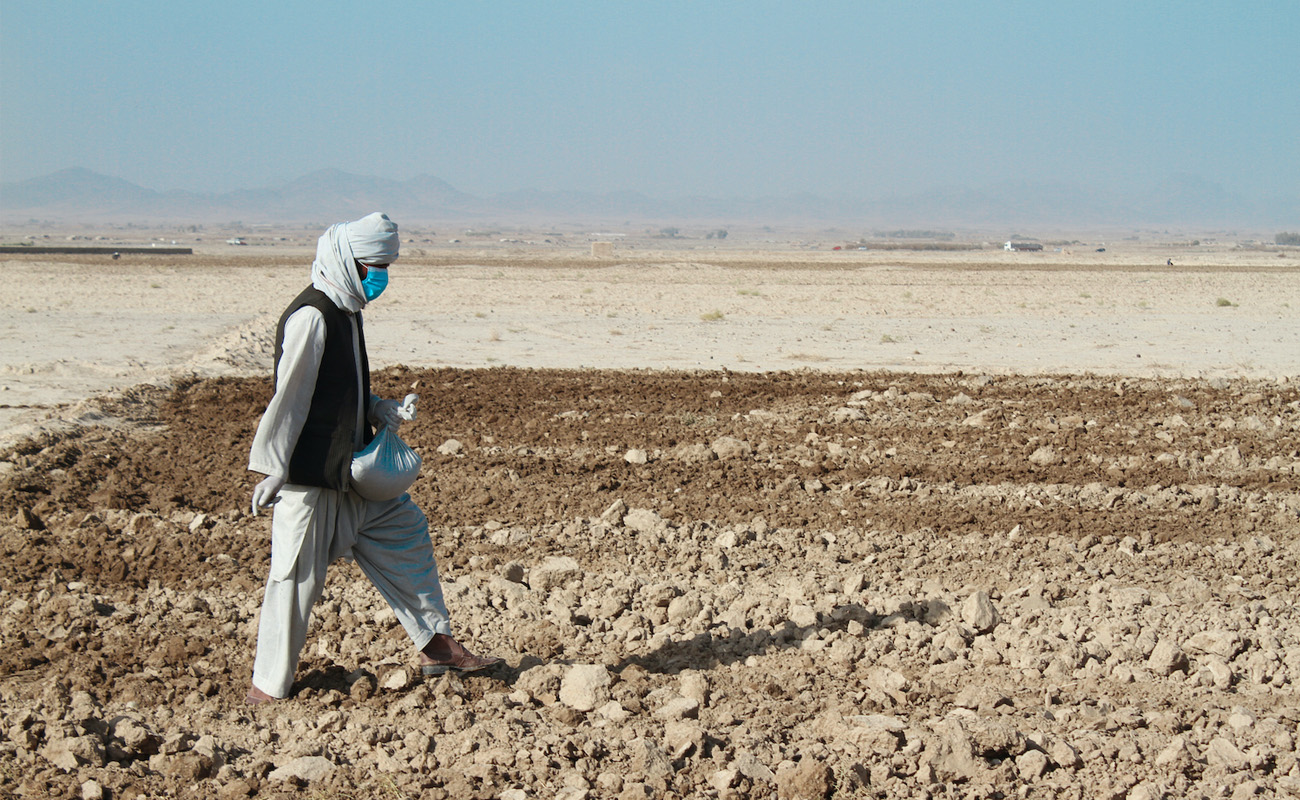Afghanistan’s Rural Economy: The Challenges & Key Development Strategies
Photo credit: ©FAO/Hashim Azizi
Farmer sows seeds he received from FAO wheat seed distribution in Daman district, Kandahar in Afghanistan.
By Abdul Wafi Nayebzai
The rural economy of Afghanistan faces numerous challenges and complexities. Despite efforts to improve its condition, it remains largely underdeveloped and vulnerable to various factors. One of the key issues affecting the rural economy is the ongoing conflict and instability in the country. Frequent clashes and security concerns hinder agricultural activities, disrupt supply chains, and discourage investment in rural areas. This not only affects farmers' livelihoods but also limits the potential for economic growth in the agricultural sector.
Another significant challenge is the lack of infrastructure and basic services in rural regions. Limited access to roads, electricity, clean water, and healthcare facilities hamper productivity and the quality of life for rural communities. Insufficient irrigation systems further exacerbate the difficulties faced by farmers, thus restricting their ability to cultivate crops effectively.
Moreover, the dependence on traditional farming methods and outdated techniques hinders productivity and reduces the competitiveness of Afghan agricultural products in the global market. Limited access to modern farming equipment, advanced technologies, and agricultural extension services limits the potential for innovation and improved productivity in the rural sector.
Climate change also poses a significant threat to the rural economy of Afghanistan. Erratic weather patterns, including droughts, floods, and unpredictable rainfall, adversely affect agricultural production and livelihoods. Farmers often struggle to adapt to these changing conditions, resulting in crop failures, food insecurity, and increased poverty levels.
Furthermore, the lack of diversified economic opportunities in rural areas leads to an overreliance on agriculture as the primary source of income. This makes rural communities particularly vulnerable to fluctuations in crop prices, market conditions, and natural disasters.
Despite these challenges, there are efforts being made to address the issues faced by the rural economy. Initiatives focusing on infrastructure development, agricultural modernization, access to credit, and capacity-building programs aim to improve the livelihoods of rural communities and promote sustainable economic growth.
In brief, the rural economy of Afghanistan confronts a multitude of challenges including conflict, limited infrastructure, outdated farming practices, climate change, and limited economic diversification. However, through targeted interventions and sustained support, there is there is a potential to enhance the resilience and productivity of the rural sector, in turn improving the lives of rural communities and contributing to the overall development of Afghanistan.
To develop the rural economy of Afghanistan, several key strategies can be considered:
- Infrastructure Development: Improving infrastructure in rural areas is crucial for economic growth. This includes investing in roads, bridges, irrigation systems, and rural electrification. Better infrastructure enables access to markets, the transportation of goods, and attracts investment.
- Agricultural Support: Agriculture is a significant sector in rural Afghanistan. Providing farmers with access to modern farming techniques, high-quality seeds, fertilizers, and machinery can enhance productivity. Additionally, offering training programs on improved agricultural practices and crop diversification can help increase farmers' income.
- Access to Finance: Facilitating access to finance for rural communities is essential. Establishing microfinance institutions or rural credit cooperatives can enable farmers and entrepreneurs to access capital for agricultural activities or starting small businesses. It promotes entrepreneurship and income generation.
- Education and Skills Training: Investing in education and vocational training programs can equip rural communities with the necessary skills for employment and entrepreneurship. This can include vocational training in areas such as agriculture, craftsmanship, and small-scale industries.
- Market Linkages: Developing effective market linkages is crucial for rural economic development. Encouraging the formation of cooperatives and supporting farmers' participation in value chains can help them access larger markets, receive fair prices for their products, and reduce dependency on intermediaries.
- Access to Basic Services: Ensuring access to basic services such as healthcare, clean water, and sanitation is essential for improving the quality of life in rural areas. This can be achieved through targeted investments and partnerships with NGOs and international organizations.
- Renewable Energy Promotion: Promoting the use of renewable energy sources like solar power can provide reliable and affordable electricity to rural communities. This can facilitate small-scale industries, enhance productivity, and improve living standards.
- Support for Small-Scale Industries (SMEs): Encouraging the development of small-scale industries in rural areas can create employment opportunities and stimulate economic growth. Providing technical assistance, access to markets, and financial support can foster the growth of micro and small enterprises.
- Strengthening Local Governance: Enhancing local governance structures and empowering local authorities can ensure effective implementation of rural development programs. Engaging communities in decision-making processes and fostering participatory approaches can lead to more sustainable and inclusive development.
- Peace and Security: Ensuring peace and security is vital for sustainable rural development. Creating a conducive environment through conflict resolution, promoting social cohesion, and addressing security challenges can attract investments and allow development initiatives to thrive.
Lastly, it is important to note that a comprehensive approach involving collaboration among government agencies, international organizations, NGOs, and local communities is necessary to achieve meaningful and sustainable rural economic development in Afghanistan.
Abdul Wafi Nayebzai is a renowned writer who has written numerous books on social and economic issues. He is also a motivational speaker. Throughout his career, he has worked with various national and international organizations, focusing on Afghanistan’s economy, communications, and public relations.
Academicians and Officials interested to publish their academic pieces on this page, please approach us through: opinions@aissonline.org.
The article does not reflect the official opinion of the AISS.

